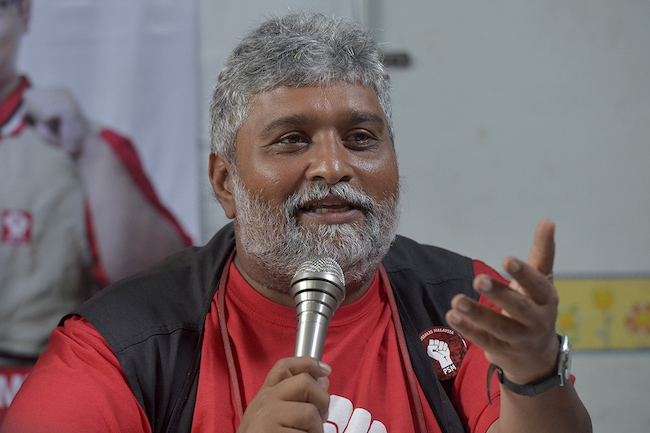IN the second part of the interview, Parti Sosialis Malaysia (PSM) deputy chairman S Arutchelvan shared his views on the socio-political instability plaguing Malaysia, from a socialist perspective.
In his opinion, the power struggle among “capitalist parties” riding on race and religion rhetoric has worsened over the years; making cronyism and poor governance “the order of the day”.
“The country, for many years, has been about race and religion politics but it has become worse now. Though UMNO, MIC and MCA call them themselves a multiracial coalition, each were perpetuating racial politics nonetheless.
“Just that somehow, they managed to create some form of unity for several decades,” he told FocusM in an exclusive interview.
Same old politics
Touching on Pakatan Harapan’s short reign in Putrajaya, Arutchelvan said that the coalition was basically capitalistic in its conduct too, with them trying to perpetuate their own neo-liberal policies, which was no different from Barisan Nasional (BN).
“When Pakatan came to power in 2018, it was a good thing initially. That’s the feeling everyone had. However, it didn’t take long for them to start implementing the same old policies made by BN,” he added.
Citing an example, he noted that Pakatan leaders shot themselves in the foot when they slashed funding meant for fishermen and Federal Land Development Authority (FELDA) in an attempt to cut spending.
“What they should have done is meet the people and find out how to go about it. Bear in mind that for some groups, the funds would impact their livelihood directly.
“And this is where Pakatan lost support from the grassroots, especially among the Malay community back then,” Arutchelvan opined.
Another blunder committed by Pakatan, he noted, was when they were non-committal in raising the minimum wage despite having promised to do so in their election manifesto.
“They only increased it by RM50. You see, they could have actually revamped the taxation policy to support such policies but it ever happened.
“All in all, their detractors managed to turn it into a racial issue, accusing former finance minister Lim Guan Eng of attempting to sideline the Malay community,” the former Kajang councillor stated.
Plus, things were made worse when Pakatan mooted the idea of ratifying the International Convention on the Elimination of All Forms of Racial Discrimination (ICERD).
“Things like ICERD and all that, they’re just too problematic for now. They don’t have to deal with it, it is not even stated in their manifesto.”
In his opinion, Arutchelvan said Pakatan should first embark of bridging the distrust among Malaysians diverse backgrounds first before implementing measures that may be seen as incendiary by some communities.
“It’s plain and simple actually. We must first commit to building trust among multiracial background before even talking about things like ICERD,” he noted.
Zuraida got backstabbed on the third vote
On local government election, the PSM leader lamented that then-Housing and Local Government Minister Datuk Zuraida Kamaruddin was left hanging by her own partners when she was insisting on restoring the third vote.
“And the migrant labour issue was the easiest to handle but Pakatan lacked the political will. In many meetings conducted with the Human Resources Ministry, companies have said that they preferred for the ministry to handle it as opposed to the Home Ministry.
“But a leader from Parti Pribumi Bersatu Malaysia was helming the ministry then and they were reluctant to let go as dealing with migrant workers meant making money and they wanted to keep the status quo.
“That is why I say, in a nutshell, both Pakatan and BN were playing the same game and the people saw it,” Arutchelvan mentioned.
In a message to the public, Arutchelvan reminded that Malaysia was not a poor country with poverty level at a manageable rate and high literacy level.
He also said that back in the 1970s, the World Health Organisation (WHO) had commended Malaysia’s healthcare system, calling it one of the best in the world.
“It’s just that our institutions need to be managed professionally instead of being driven by politicians.
“Just look at our government-linked companies (GLC). Until today, they are being run by ruling party members. This has to change if we want our country to progress,” he remarked. – Feb 3, 2022









